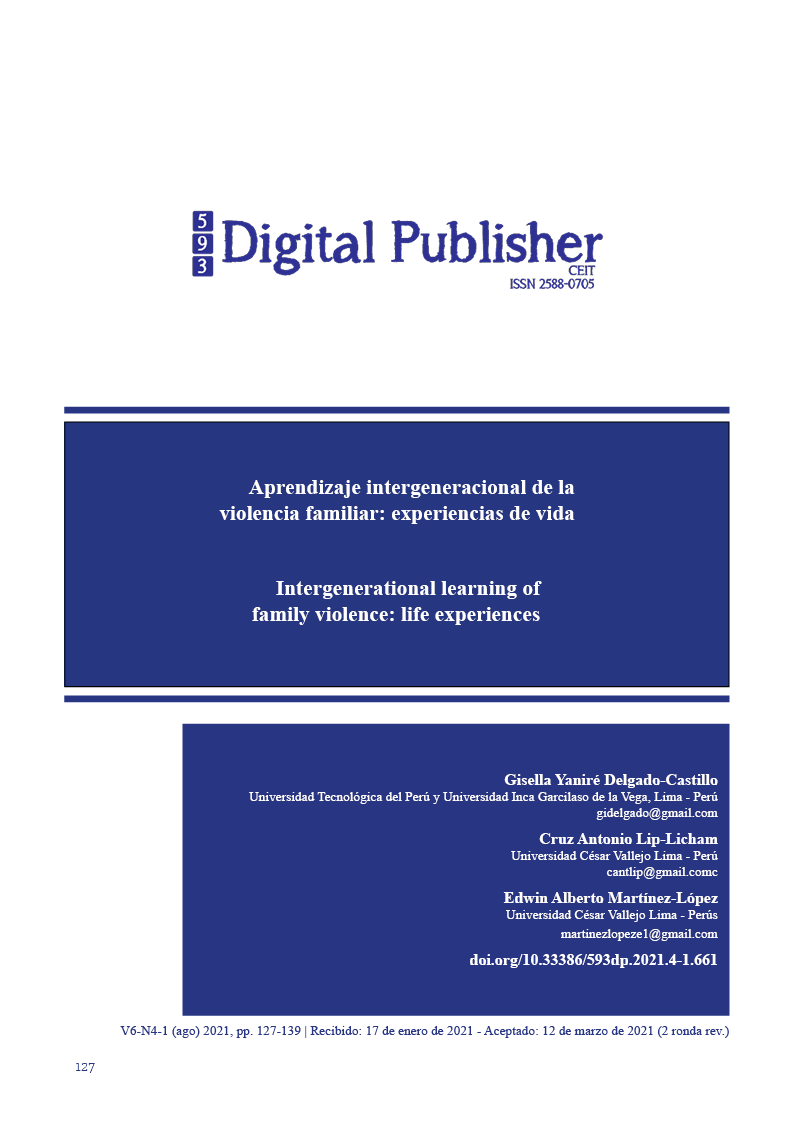Intergenerational learning of family violence: life experiences
Main Article Content
Abstract
The objective was to find out if family violence is conditioned by intergenerational learning; It inquired about referential experiences and delved into family models of upbringing, in type socio-family antecedents and in determining if they were transmitted internally, conditioning the replication of violent attitudes through generations. Under the interpretive paradigm, the study had a qualitative approach and a hermeneutical phenomenological design, the sample consisted of three university students, their mothers and grandmothers; who experienced family violence. Intergenerational transmission channels were identified by way of upbringing, sociocultural patterns, environmental factors and personal interests. It was concluded that they had been victims of domestic violence, as part of a deep-rooted intergenerational learning; It was also evidenced that the students had interrupted the process of violence due to personal growth, self-sufficiency, academic-formative level and the environments in which they develop; promoting a de facto separation, avoiding violence and interrupting the intergenerational learning chain.
Downloads
Article Details

This work is licensed under a Creative Commons Attribution-NonCommercial-ShareAlike 4.0 International License.
1. Derechos de autor
Las obras que se publican en 593 Digital Publisher CEIT están sujetas a los siguientes términos:
1.1. 593 Digital Publisher CEIT, conserva los derechos patrimoniales (copyright) de las obras publicadas, favorece y permite la reutilización de las mismas bajo la licencia Licencia Creative Commons 4.0 de Reconocimiento-NoComercial-CompartirIgual 4.0, por lo cual se pueden copiar, usar, difundir, transmitir y exponer públicamente, siempre que:
1.1.a. Se cite la autoría y fuente original de su publicación (revista, editorial, URL).
1.1.b. No se usen para fines comerciales u onerosos.
1.1.c. Se mencione la existencia y especificaciones de esta licencia de uso.
References
yala, R. (2008). La metodología fenomenológico hermenéutica de M. Van Manen en el campo de la investigación educativa. Posibilidades y primeras experiencias. Revista de Investigación Educativa.
http://revistas.um.es/rie/article/viewFile/94001/90621
Bandura, A. (1989). Human agency in social cognitive theory. American psychologist, 44, 9-15.
Banco Mundial (2005). Informe anual. Enero 2005 N° 60
Cambero Rivero, S. & Rangel Preciado, N. (2020). Aprendizaje Intergeneracional en Contextos Familiares y Socio-Educativos. Estudio de Caso en la Comarca Extremeña de Sierra Suroeste, International Journal of Sociology of Education, 9(1), 1-33. doi: 10.17583/rise.2020.4210. http://dx.doi.org/10.17583.
Clark, R. C. (2016). E-learning and the science of instruction: Proven guidelines for consumers and designers of multimedia learning. John Wiley & Sons.
Corsi, J. (2010) La violencia hacia las mujeres como problema social. Análisis de las consecuencias y de los factores de riesgo. Documentación de apoyo, fundación Mujeres. https://n9.cl/d70ef
Corsi, J. et al. (2003) Maltrato y abuso en el ámbito doméstico: fundamentos teóricos para el estudio de la violencia en las relaciones familiares. 2003. https://n9.cl/wbqug.
Esteban, M.(2003). Investigación cualitativa en educación. Fundamentos y tradiciones. Madrid: Mc Graw and Hill Interamericana,
Gagné, R. M. (1986). La instrucción basada en la investigación sobre el aprendizaje. . México: Universidad Iberoamericana.
Martínez, A. (2016). La violencia. Conceptualización y elementos para su estudio. Política y cultura, (46), 7-31. Recuperado en 08 de octubre de 2020, de http://www.scielo.org.mx/scielo.php?script=sci_arttext&pid=S0188-77422016000200007&lng=es&tlng=es.
Mayer, R. E. (2002). Psicología de la educación: el aprendizaje en las áreas de conocimiento (Vol. 1). . Pearson Educación.
McLeod, D. A., Havig, K., Natale, A., & Pharris, A. (2020). Intimate Partner Violence: Innovations in Theory to Inform Clinical Practice, Policy and Research. Social Sciences, 9(5), 71.Spapens & Moors.
https://www.who.int/violence_injury_prevention/violence/world_report/en/abstract_es.pdf
Pereira, R., Loinaz Calvo, I., Hoyo Bilbao, J. D., Arrospide, J., Bertino, L., Calvo, A., & Gutiérrez, M. M. (2017). Propuesta de definición de violencia filio-parental: Consenso de la sociedad española para el estudio de la violencia filio-parental (SEVIFIP). Papeles del Psicólogo, 2017, vol. 38, núm. 3, p. 216-223.
OMS. (2002). Informe Mundial sobre la violencia y la salud. Recuperado de: http://www.who.int/violence_injury_prevention/violence/world_report/es/summary_es.pdf.
Woolfolk, A. (2006) Psicología educativa. Pearson educación. https://n9.cl/nrai




